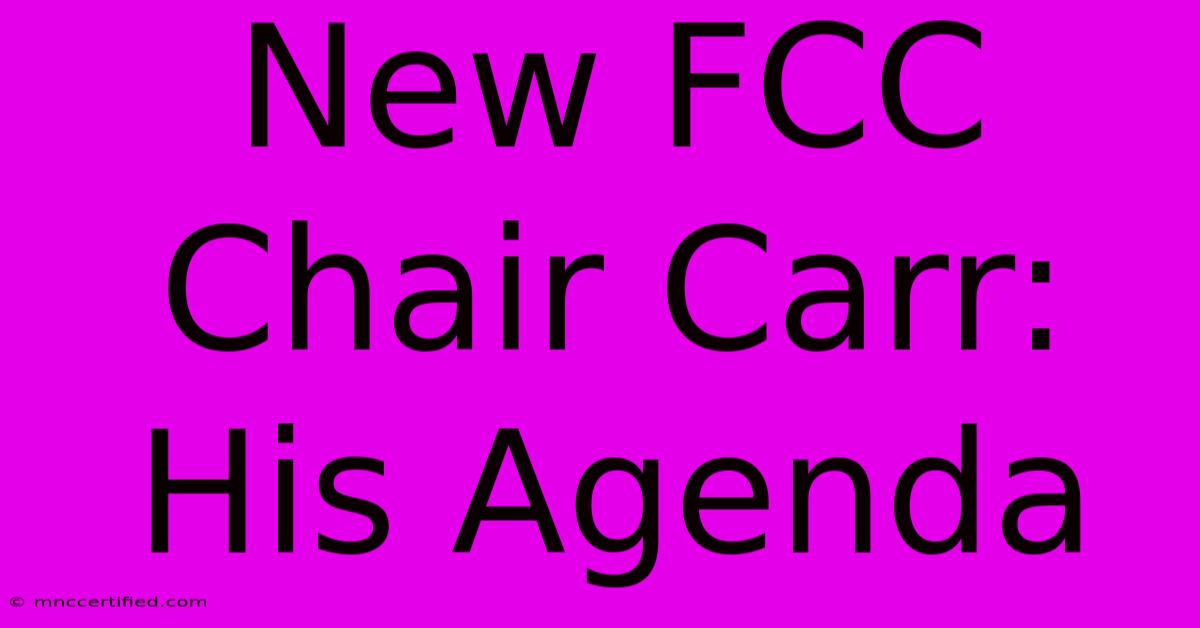New FCC Chair Carr: His Agenda

Table of Contents
New FCC Chair Carr: Unveiling His Agenda and Its Implications
The appointment of Jessica Rosenworcel as the permanent Chair of the Federal Communications Commission (FCC) marked a significant shift in the agency's direction. However, with her departure, Brendan Carr's ascension to the chairmanship has introduced a new era with a distinctly different agenda. Understanding Carr's priorities is crucial for anyone following the telecommunications, media, and technology landscapes. This article delves into the key aspects of Chair Carr's agenda, analyzing its potential impacts and broader implications.
Carr's Key Policy Priorities: A Focus on Deregulation and Competition
Carr's tenure at the FCC has been characterized by a strong emphasis on deregulation, promoting competition, and a critical stance towards large technology companies. Unlike his predecessors, he advocates for a lighter regulatory touch, believing it fosters innovation and benefits consumers. This approach is sharply contrasted with the more interventionist policies often favored by previous FCC Chairs.
1. Challenging Big Tech: Antitrust and Net Neutrality
One of Carr's central concerns is the dominance of large technology companies. He's been a vocal proponent of antitrust measures aimed at curbing their power and promoting a more level playing field for smaller players. This includes scrutiny of mergers and acquisitions, investigations into anti-competitive practices, and a reevaluation of existing regulations concerning data privacy and market dominance. His views on Net Neutrality are also noteworthy; while not advocating for a complete dismantling of the principles, he's expressed skepticism about the current regulatory framework and its potential negative impact on innovation. He’s likely to push for a less prescriptive approach, possibly prioritizing market-based solutions.
2. 5G Deployment and Infrastructure Investment: Fueling Innovation
Carr recognizes the crucial role of 5G deployment in driving economic growth and technological advancement. He has consistently advocated for policies that streamline the permitting process for new infrastructure, making it easier and faster for telecommunication companies to deploy 5G networks. This includes addressing issues related to spectrum allocation and reducing regulatory hurdles that impede investment in broadband infrastructure. His focus here strongly emphasizes the need to accelerate innovation and ensure widespread access to high-speed internet.
3. Media Ownership Rules and Consolidation: A Balancing Act
The issue of media ownership and consolidation remains a complex and contentious one. While Carr supports fostering competition, his approach to media ownership rules isn't strictly laissez-faire. He'll likely prioritize a case-by-case analysis, balancing the need for diversity of voices with the realities of the evolving media landscape. Expect to see a nuanced approach, neither dramatically loosening nor tightening restrictions without thorough consideration of the potential consequences.
4. Combating Illegal Streaming and Copyright Infringement: Protecting Intellectual Property
The rise of illegal streaming services has become a significant concern. Carr is likely to actively pursue measures to combat copyright infringement and protect the intellectual property rights of content creators. This could include increased enforcement efforts, working with international partners, and potentially exploring new technologies to tackle this challenge effectively. This emphasis on IP protection shows a willingness to leverage the FCC's powers to address a growing concern within the entertainment industry.
The Broader Implications of Carr's Agenda
Carr's agenda has significant implications for various sectors:
- Telecommunications Companies: They'll likely experience both opportunities (through deregulation and streamlined infrastructure deployment) and challenges (increased scrutiny of mergers and anti-competitive practices).
- Technology Companies: Big tech faces increased pressure to address antitrust concerns and potentially more stringent regulatory oversight.
- Consumers: The ultimate impact on consumers is complex and depends on the success of policies aimed at boosting competition, lowering prices, and improving service quality.
Conclusion: Navigating the Uncertainties Ahead
Chair Carr's leadership will shape the future of telecommunications and media in the US. His emphasis on deregulation and competition, coupled with a critical eye toward Big Tech, presents both opportunities and uncertainties. The coming years will be crucial in assessing the effectiveness of his policies and their impact on various stakeholders. Staying informed about FCC activities and ongoing policy debates is crucial for anyone interested in the evolving landscape of communications technology.

Thank you for visiting our website wich cover about New FCC Chair Carr: His Agenda. We hope the information provided has been useful to you. Feel free to contact us if you have any questions or need further assistance. See you next time and dont miss to bookmark.
Featured Posts
-
National States Insurance Company
Nov 19, 2024
-
Spirit Airlines Bankruptcy Broward Impact
Nov 19, 2024
-
Coleen Rooneys Jungle Trial
Nov 19, 2024
-
Enjoy Thanksgiving Dinner In Utah
Nov 19, 2024
-
Top Gifts For Kc Chiefs Fans
Nov 19, 2024